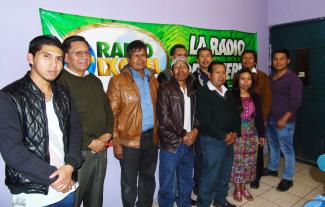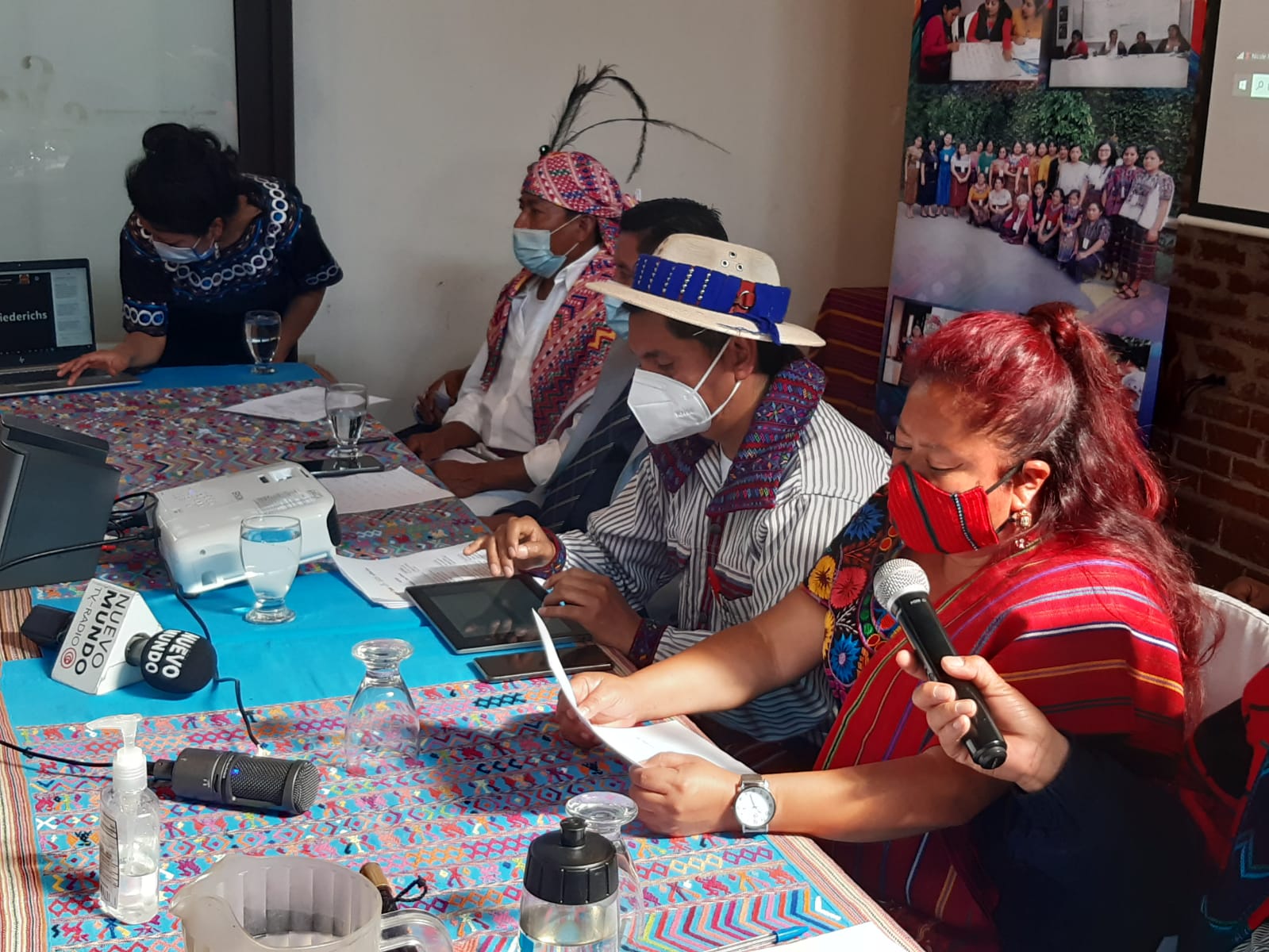
On December 17, 2021, the Inter-American Court of Human Rights announced its decision in the case Indigenous Maya Kaqchikel Peoples of Sumpango vs. Guatemala. The Court ruled that the Republic of Guatemala was “internationally responsible for the violation of the rights to freedom of expression, equality before the law, and participation in cultural life” of Indigenous Peoples.
The case, brought by Cultural Survival, Guatemala-based Asociación Sobrevivencia Cultural, and submitted with support from the Human Rights and Indigenous Peoples Clinic at Suffolk University Law School, argued that Guatemala’s telecommunications law excludes Indigenous Peoples from accessing their own forms of media via community radio. María Pedro de Pedro (Maya Q’anjob’al) from Radio Snuq’ Jolom Konob’ in Santa Eulalia, Huehuetenango, emphasized the importance of community radio to Indigenous communities. Through radio, she says, “we are protecting our cultural identity, we are protecting our culture, our music, our art, our traditions, our customs, our language, our surnames. . . . The microphone is power.”
The historic decision came after decades of activism by members of the Indigenous community radio movement in Guatemala fighting for their freedom to operate radio stations and broadcast information in Indigenous languages to and from their communities. Currently, in Guatemala, Indigenous community radio stations are still not legalized more than 26 years since this right was guaranteed in the Guatemalan Peace Accords. They continue to operate in a legal gray zone that has led to frequent persecution by mainstream media conglomerates, the national police, and politicians.

December 28, 2021 press conference about the groundbreaking InterAmerican Court of Human Rights decision. Photo courtesy of Asociación Sobrevivencia Cultural.
“The Inter-American Court correctly holds that freedom of expression is a cornerstone of any democratic society. Therefore, the decision is a major victory for Indigenous Peoples in Guatemala and a great opportunity for the Guatemalan State to be a leader in making amends to Indigenous communities, who constitute half of the population. It is also an important precedent for Indigenous Peoples in Latin America as it affirms the rights of Indigenous Peoples to collective and individual freedom of expression, and the right to practice their culture without discrimination,” says Monica Coc Magnusson (Q’eqchi Maya), Cultural Survival’s Director of Advocacy and Policy.
Anselmo Xunic Cabrera (Maya Kaqchikel), a member of Radio Ixchel, a community radio station from Sumpango Sacatepequez, Guatemala, said, “This has been a historic struggle for Indigenous Peoples. This decision will have an impact in Latin America and around the world. This sentence is a blow to the State, which has been racist, exclusive, and criminalizing. This news moves the heart.”
On April 3, 2020, the Inter-American Commission on Human Rights referred the case to the Inter-American Court of Human Rights. From June 9–10, 2021, the Court heard passionate testimonies from representatives of Indigenous community radio stations, experts on the right to freedom of expression and Indigenous rights, and representatives of the State of Guatemala. Currently, one of the only ways to obtain a radio license is by taking part in an auction. However, as Xunic testified during the hearing, “The auctions are discriminatory because from an economic standpoint we can’t pay that amount and we can’t compete as Indigenous Peoples.”
José Francisco Calí Tzay (Maya Kaqchikel), UN Special Rapporteur on the Rights of Indigenous Peoples, emphasized that “access to community radio is critical to the transmission of language and culture” and that “Indigenous Peoples rely on this medium to inform and educate their communities, especially during the COVID-19 pandemic. Obstacles to radio frequency access translate to indirect discrimination against Indigenous communities . . . that, de facto, discriminates against Indigenous Peoples, as is the case of Guatemala’s general telecommunications law.”
The State of Guatemala has continuously ignored national and international laws and obligations regarding freedom of expression and many specific recommendations to recognize the community radio stations of Indigenous Peoples, while being one of the State signatories of the International Labor Organization Convention 169 and the United Nations Declaration on the Rights of Indigenous Peoples. The State has promoted discriminatory laws such as the General Telecommunications Decree 94–96, in force
since 1996, which uses auctions as the only mechanism to legally access radio frequency licenses. In 2012, this legislation was extended for another 20 years without consulting with Indigenous Peoples. Since 2006, the Public Ministry has misused the penal code to criminalize existing community radio stations. Proposed legislation to recognize Indigenous Peoples’ media have been stymied for decades, including Bill 4087, pending approval since 2010.
“This decision is a victory not only for Guatemala but also for Indigenous Peoples throughout this hemisphere in protecting their rights to expression and culture and promoting pluralism in media. Of particular significance is the Court’s recognition of Indigenous Peoples’ right to operate their own media, and the relationship of this right to freedom of expression, culture, self-determination, and non-discrimination. This recognition by the Inter-American Court of Indigenous Peoples’ right to media may impact how other judicial and human rights bodies interpret and promote this right under the UN Declaration on the Rights of Indigenous Peoples,” said Nicole Friederichs, lead counsel on the case and Clinic Director at Suffolk University Law School.
The Court’s decision is a major milestone for Indigenous rights. The Court ruled that the State of Guatemala violated Articles 1.1 (Obligation to Respect Rights), 2 (Domestic Legal Effect), 13 (Freedom of Thought and Expression), 13.2, 24 (Right to Equal Protection), and 26 (Progressive Development) of the American Convention on Human Rights. Decisions of the Inter-American Court are binding, meaning that the State of Guatemala is required to change the law. The Court ordered that Guatemala facilitate the identified victims’ free operation of community radio stations; amend domestic laws to recognize Indigenous community radio as a unique means of communication; establish simple procedures for obtaining licenses; reserve a sector of the radio spectrum for Indigenous community radio; and abstain from criminalizing individuals who participate at Indigenous community radio stations. The ruling also includes reparations for four of the affected communities. The Court further “affirmed the right of Indigenous Peoples to establish and use their own communication media, based on the content and the scope of the right of freedom of expression, but also taking into account the rights of Indigenous Peoples not to be discriminated against, their right to self-determination, and their cultural rights.”
There is no definitive timeframe for the State of Guatemala to comply with the ruling, however, the government must comply with the following deadlines: the Court’s decision must be published in full in the press in Guatemala within one year. The four named affected Indigenous radio stations must be recognized by the government and must be financially compensated within one year. And criminal prosecution of those who work at the community radio stations, as well as government raids of the stations, must be stopped immediately.
Reflecting on the Court’s decision, Xunic said, “We’ve suffered 18 years of persecution and defamation. They have called us pirate radios, illegal radio stations; they’ve called us subversive radio, and even terrorist radios. Now we’ve been proven right.” Amy Van Zyl-Chavarro, co-counsel from the Human Rights and Indigenous Peoples Clinic, said, “The idea that Indigenous Peoples might have the right to operate their own means of communication is precisely to increase the number of voices that are in the media in general, which increases pluralism. This is the first time that an international tribunal has spoken out about the rights of Indigenous Peoples to create and use their own means of communication. This is a ruling that other Indigenous communities can use to advocate for their rights internally and try to get their governments to follow these recommendations from the Court.”
This is a monumental victory for Indigenous communities in Guatemala and around the world. Community radio stations keep local communities informed about important issues such as the global pandemic, but they also help to promote local language and culture and keep Indigenous traditions alive. Rosendo Pablo Ramirez (Maya Mam), Director of Radio Xob’il Yol Qman Txun in Todos Santos Cuchumantán, Huehuetenango, made this clear in his testimony in court, stating, “We are spreading our music . . . it makes us happy. That is the importance [of community radio]. Talking about culture on the radio makes us remember, and as a result we can continue to exist in this world.” With this ruling, the Inter-American Court of Human Rights has affirmed that freedom of expression constitutes a corner-stone of a democratic society.
